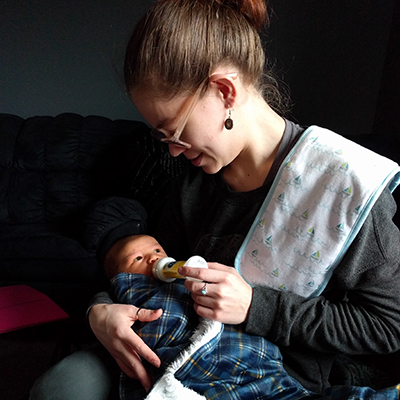
When Caitlin Maudlin and Analuz Torres-Giron heard about Oregon State University’s new research project measuring the prevalence of COVID-19 in Corvallis, they were ready to jump in with both feet.
As traditional health workers, helping the community and caring for others comes with the job.
“I’m very passionate about public health and saw this as an amazing opportunity to serve my community,” Caitlin says. “I’m looking forward to the many ways this study will end up informing health and government decisions around COVID-19.”
There are five types of traditional health workers (THWs) in Oregon – community health workers, doulas, peer support specialists, patient navigators and peer wellness specialists. THWs is the umbrella term for certified public health workers who share, among other things, lived experience, language and culture and understand the community they serve.
THWs are trusted members of the community who serve as a liaison between the health system and the clients they serve and are trained on topics such as home visiting, community engagement, cultural sensitivity and more.
“We specifically recruited THWs to lead our field teams due to their extensive experience in community engagement and the fact that they are from the community,” says CPHHS epidemiologist and project leader Jeff Bethel. “They have been ideal ambassadors of TRACE and are vital to the success of the project.”
A doula in the Community Doula Program and at her private practice, Enlightened Beginnings Birth Services, Caitlin supports families in a variety of ways throughout pregnancy, birth and immediate postpartum. Analuz has been a community health worker for seven years with the Benton County Health Department.
Since 2017, Analuz facilitated CHW training for Benton, Linn and Lincoln counties, and in her spare time is a doula and board member for the Community Doula Program, serving primarily Spanish and Mam speakers in the Linn-Benton area. She’s also a member of the state’s Traditional Health Worker Commission.

Both women joined the research project, TRACE-COVID-19, as field workers, accompanying an OSU student in connecting with Corvallis residents who may want to participate in the project. A team leader, Caitlin is the first face many community members see when they open their door. She then explains the testing process and safely collects the sample.
“I’ve been drawing a lot on my experience as a THW when going door to door,” she says. “Over the years, I’ve developed communication and listening skills that have been super helpful when talking to volunteers and explaining the study to them. I also have a deeper understanding informed consent, preserving confidentiality, and shared decision making, all skills that have been invaluable while working with TRACE.”
Analuz has assisted the team by hiring other THWs, drawing on her professional network of CHWs as the CHW training coordinator and facilitator for Benton, Lincoln and Linn counties. The experience, she says, has been rewarding.
“Seeing people facing this pandemic and making drastic changes to their lives to avoid getting infected is quite impactful,” Analuz says. “It is heartbreaking to see families separated, not seeing each other, and grandparents not being able to hug their grandkids. When I am out in the field collecting data and interacting with participants, I am often reminded of the situations they are facing.”
Each weekend of testing has been a unique experience, Caitlin says. “At some doors we knock on, people already know who we are and what we’re doing and are more than happy to contribute. With others, we get to introduce ourselves and TRACE for the first time.
“The kindness we’ve been shown has been so uplifting. For many of the people we’re testing, this is the only chance for them to be tested, not to mention the first conversation they’ve had in a while with someone outside their home.
“The real kicker has been the folks out for a stroll or walking their dogs who stop to thank us for our work. It has been amazing to be part of something that has real impact in so many lives. I would happily do this again, although I really hope it won’t be needed for a long time.”
Interested in becoming a THW? Visit our website to learn how you can empower communities to improve health.